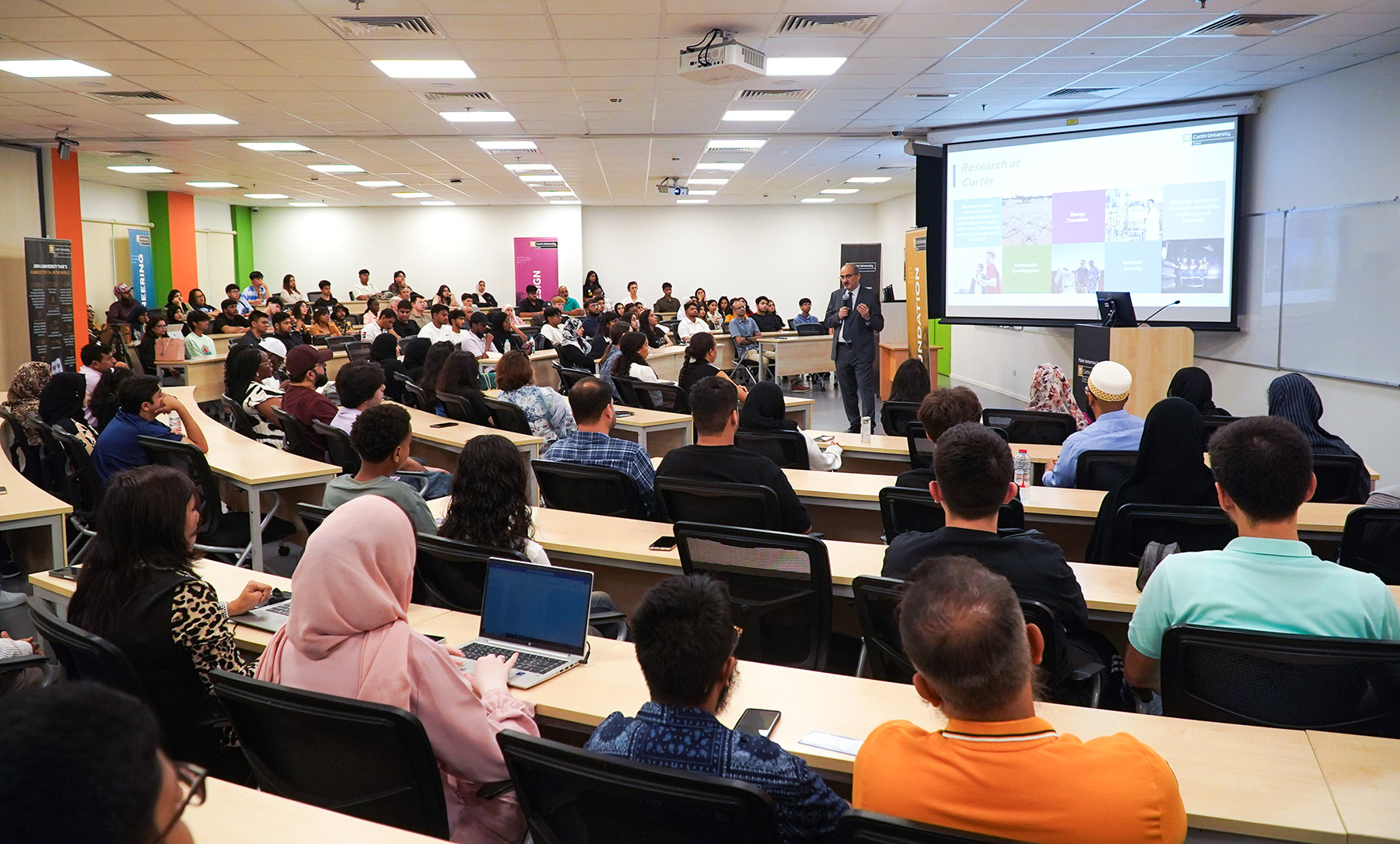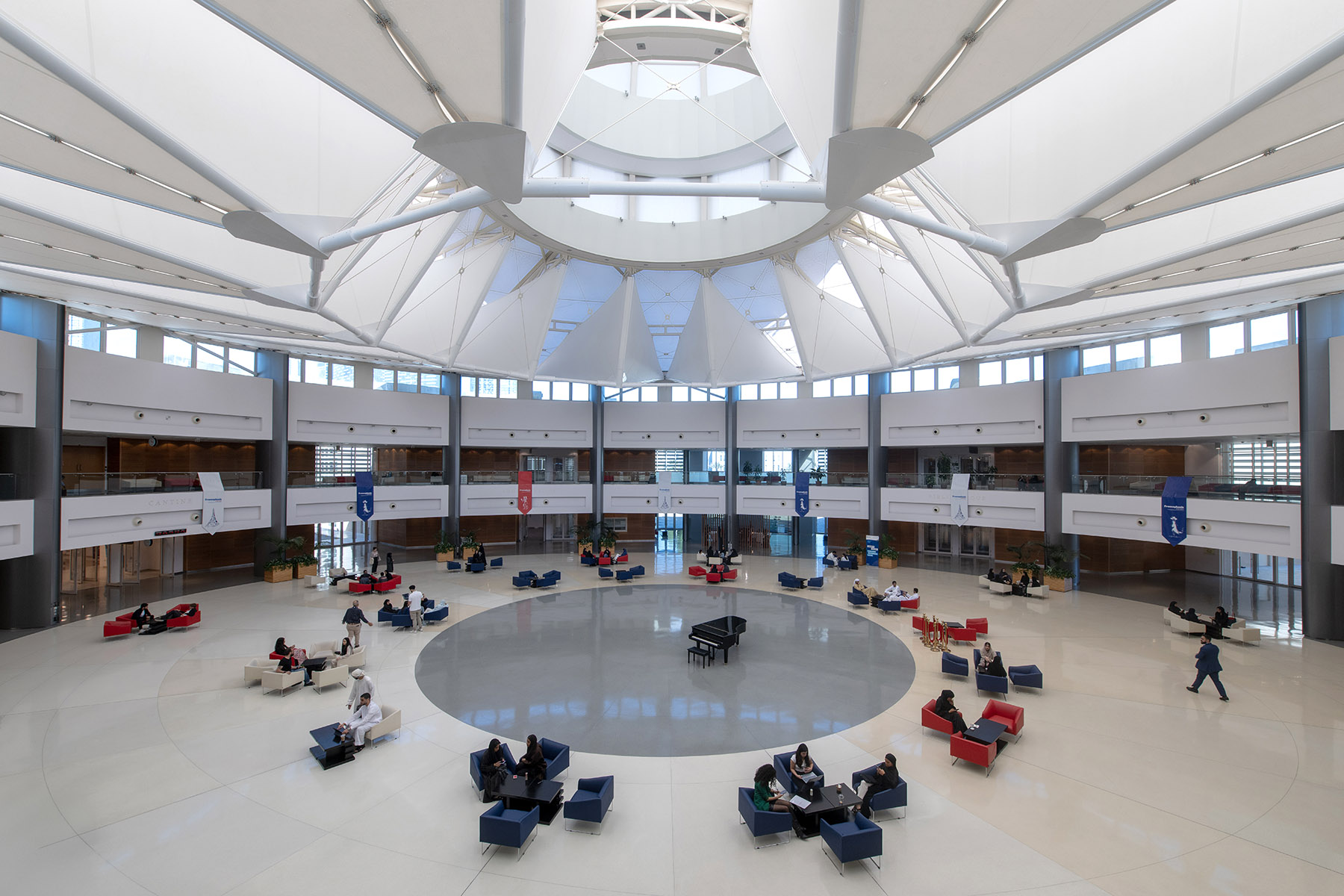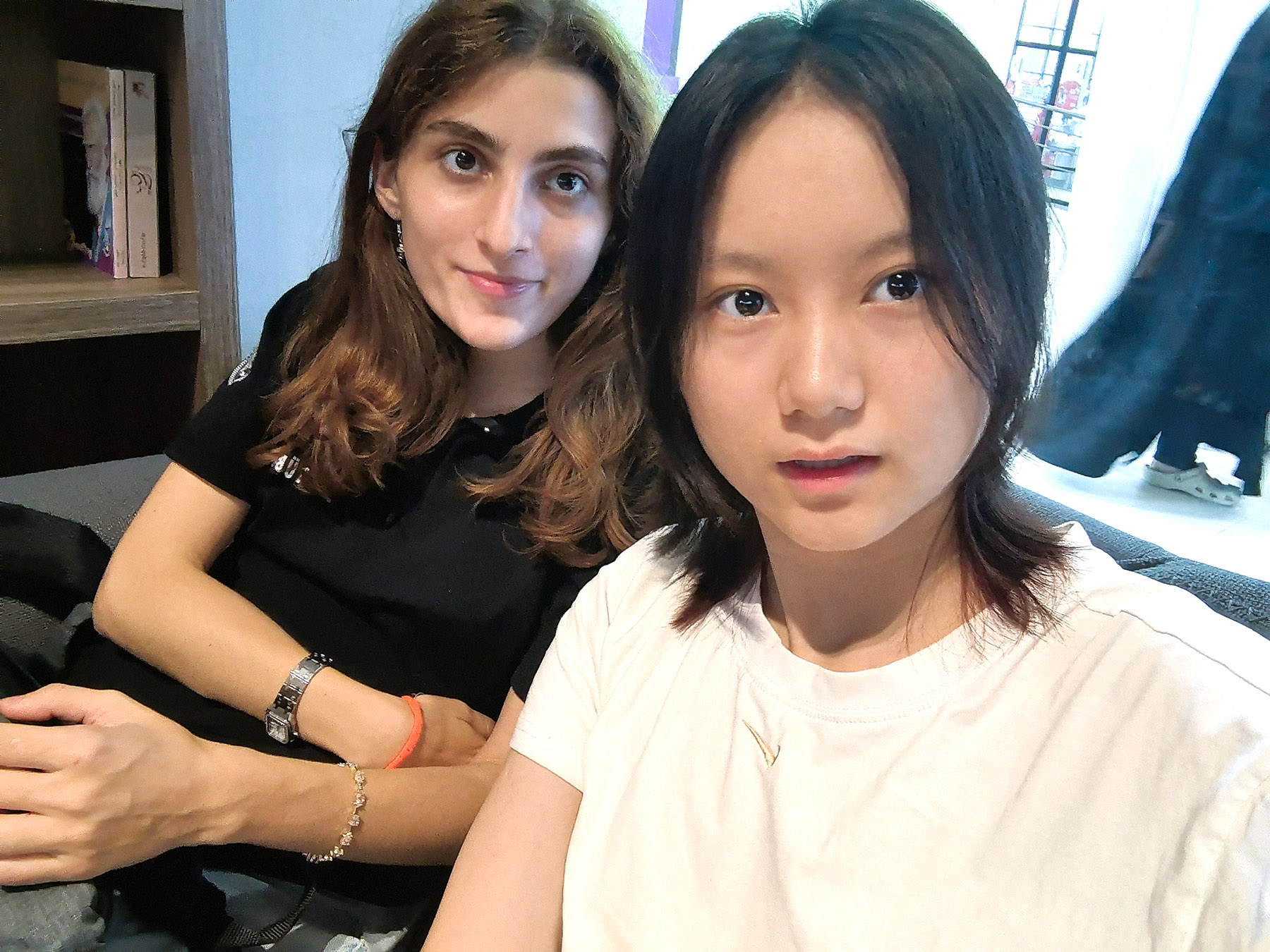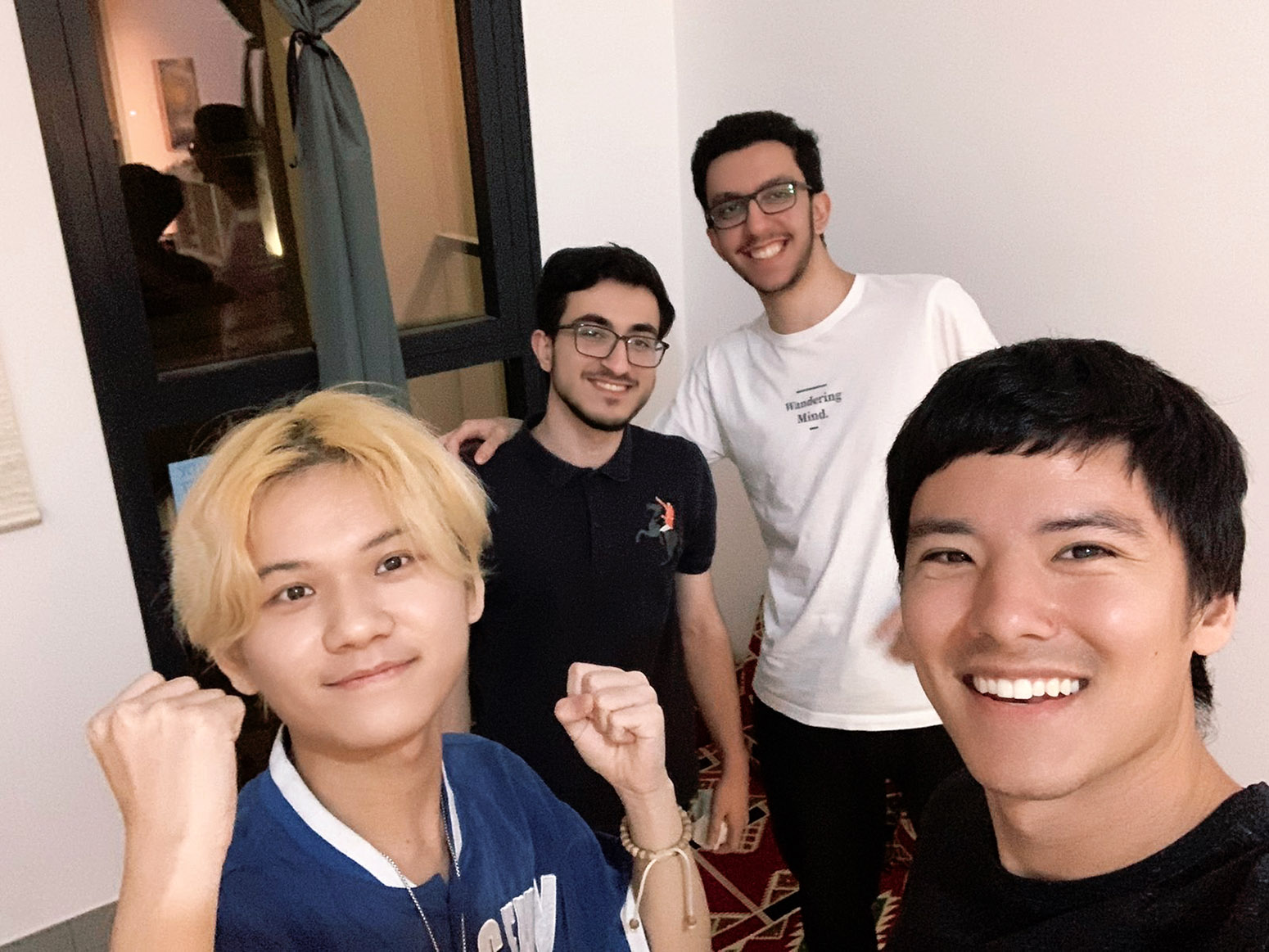Business, cultural connections, jobs and BRI attract Chinese to region's universities

Under the searing sun, 19-year-old Wu Yuqing dragged her suitcase across the sprawling campus of King Fahd University of Petroleum and Minerals in Saudi Arabia — her new home for the next four years.
Just a day earlier, she had been in her hometown of Shuozhou, Shanxi province. Nearly 24 hours later, after taking a train to Beijing and a plane to Abu Dhabi in the United Arab Emirates, and then making a final hop to Dammam in eastern Saudi Arabia, she started her overseas study experience at the university.
Wu is among a small but growing group of Chinese students now turning away from the well-trodden paths to North America, Europe and Australia, and toward the Middle East — a region once seen as distant, but now increasingly tied to China through trade, infrastructure and education.
READ MORE: Chinese school Dubai serves as a bridge between cultures
When she stepped off the plane in mid-August, the heavy, humid air from the nearby coast engulfed her.
"The university is huge, a bit like a large community," Wu said after her first walk around the campus. "There are kindergartens, primary, middle and high schools here, separate shopping centers for men and women and a medical center — even getting around requires the school bus, because walking would take too long."

Her mother, who accompanied her for registration, felt reassured after seeing the double dormitory room of about 40 square meters that Wu will share with a roommate from Turkiye.
"My city is very small, and hardly anyone around me goes abroad, so I had never thought about studying overseas for my undergraduate degree," Wu said. "I knew very little about it."
Generous scholarships, promising job prospects in energy and technology, and a surge in economic links have made universities from Saudi Arabia to the UAE attractive for ambitious young Chinese like her.
Wu previously attended Shuocheng No 1 High School in Shanxi. Exhausted by the demands of high school, she decided to forgo the gaokao college entrance exam and pursue a university education abroad.
"I was feeling really tired from high school. And when I learned about the option to study in the Middle East, it felt like a fresh start," she recalled.
She received offers from several institutions, including Sorbonne University Abu Dhabi and the University of Sharjah, but chose King Fahd University of Petroleum and Minerals, ranked 67th globally in the QS World University Rankings 2026. Awarded a full scholarship covering tuition, flights, accommodation and living expenses, she became the first Chinese undergraduate admitted to the university.
Wu enrolled in the newly established data science and engineering program and plans to work locally after graduation. "The full scholarship also eased some of the financial pressure on my parents," she said.

Chinese influx
While still a relatively niche choice, the Middle East is attracting more Chinese students each year.
Since 2018, Zhou Xiao, CEO of Middle-East International Education, has helped hundreds of students plan and apply for full or high-value scholarships to universities across the UAE, Qatar, Saudi Arabia and other Middle Eastern countries.
Zhou's agency has offices in Changsha, Hunan province, Hangzhou, Zhejiang province, and Guangzhou, Guangdong province, though most students historically came from Changsha. "But since last year, I've noticed more students coming from Jiangsu (province), Zhejiang, Shanghai and Guangdong who are interested in studying in the Middle East," he said.
While more agencies were competing fiercely for universities in Europe and the United States, Zhou said he believes that the international education sector could serve ordinary families.
"I wanted a path that combined studying abroad with employment," he said. "Also, amid changing international relations, our exchanges with the Middle East were increasing."
The pandemic initially disrupted his Middle East programs, but demand surged by 2024.
"Previously, some students chose the Middle East as a more affordable alternative to Europe and the US, or their parents were doing business in Dubai. But by 2024, more parents from international schools or first-tier cities began considering the return on investment of studying abroad," he said.
"Many run their own businesses or are increasingly exposed to the UAE and Saudi Arabia, so the student group changed significantly," he added.
Undergraduates are attracted by high-value scholarships, the region's economic environment, safety and living conditions, while employment opportunities and income are also major draws, he said.
Zhou has visited numerous Middle Eastern universities, including local institutions and branch campuses of Western institutions.
"Schools are very welcoming to Chinese students. Chinese is a required subject in many schools, and there is a strong demand for Chinese teachers. Schools also want student diversity. In specialized fields like AI, low-altitude aviation and new energy, there is an urgent demand for Chinese research talent," he said.
Popular fields include logistics, business, AI and law, with top university choices including New York University Abu Dhabi, Mohamed bin Zayed University of Artificial Intelligence in the UAE, the King Abdullah University of Science and Technology in Saudi Arabia and KFUPM. Some Western branch campuses actively recruit in China and have even hired Chinese admissions officers.
"The growing demand is closely linked to China's Belt and Road Initiative," Zhou said.
Besides student numbers, tourism and real estate are also expanding, and the number of Chinese faculty members is increasing. After seven years, only two students placed by Zhou's company have returned to work in China; the rest found local employment.
Around 6,000 Chinese companies operate in the UAE, mostly concentrated in Dubai, according to Dubai Multi Commodities Centre data in 2024.
"Employment conditions have improved. Companies are more standardized, (they) consider long-term development, and highly educated people have better prospects and higher starting salaries," Zhou said.

Adapting, flexibility
After the summer break, Luo Hao, 22, returned to the University of Sharjah in the UAE, where he studies international relations.
Luo learned about studying in the Middle East through an international program at Changsha Railway No 1 High School, which prepares students with the IELTS English program, basic Arabic and general courses.
"This program suits students who might not excel in the gaokao. My arts subjects were fine, but my science subjects were weak, so I chose this program," he said.
In 2022, Luo enrolled at the university after receiving a 50 percent tuition scholarship.
"At first, it was hard to manage everything alone — paying fees, registering for courses and getting an ID and a SIM card," he recalled. "The courses are all in English, so it was challenging, but I adapted."
Luo praised the university's teaching style. "Courses encourage participation and expressing opinions, not just grades. Instructors come from all over the world and often share their experiences," he said.
Adapting to the UAE's heat was another challenge.
"I had never left my hometown before. Going abroad lets you truly experience the world," he said.
Over time, he adjusted to the study and living conditions, and his parents became reassured by seeing him thrive.
Luo mostly cooks for himself, with Chinese supermarkets nearby offering affordable food items. With one year left in his studies, he hopes to work locally for two years. "Graduates I know earn around 16,000 yuan ($2,250) per month in administrative jobs. The job market is decent," he said.
He has noticed more Chinese students arriving each year. His major is niche, with only two to three Chinese students, while popular fields like business and engineering attract more students. "About 30 exchange students from China come every year," he said.
Campus life is vibrant, with Chinese students sharing their culture through clubs and activities like calligraphy and riddle games. "Students here are very interested in Chinese culture, and our booths always draw crowds," Luo said.

More choices
Universities in the Middle East are increasingly opening their doors to Chinese students.
In 2024, Dubai was home to 34,000 university students, with 33 percent from outside the UAE, according to the city's Knowledge and Human Development Authority. Among them were 741 Chinese students, with 29 percent of those pursuing undergraduate degrees and 71 percent studying for master's degrees.
In 2017, Curtin University, an Australian tertiary institution with three campuses in Western Australia and five campuses globally, launched its Dubai campus, which is located in the Dubai International Academic City.
Over the past 15 years, Professor Ammar Kaka, pro vice-chancellor and president of Curtin University Dubai, has witnessed significant growth in the number of international students.
"We do have a small number of students from China who come to study with us, but the majority are professionals already working in the UAE," Kaka said.
"China is definitely a market we are keen to grow further, especially given Curtin University's strong connections with Chinese students across our campuses in Australia, Singapore and Malaysia. We already have extensive partnerships with universities in China, including joint programs and pathways that allow students to earn dual degrees," he added.
Kaka has visited China several times and delivered keynote speeches at events organized by the Chinese Service Center for Scholarly Exchange. He said he believes China's growing economic ties with Gulf Cooperation Council countries, particularly the UAE, make the region an attractive destination for Chinese students.
"We are also seeing growth in the Chinese expatriate community here. To give one example, Dubai even has a mall dedicated mainly to Chinese goods, highlighting the depth of cooperation and trade between the two countries," he said.
For Chinese students studying in Dubai, Kaka sees multiple benefits.
"They gain exposure not only to the culture, but also to the business landscape, and many take advantage of opportunities for internships during their studies," he said. "At the same time, they can immerse themselves in Arabic culture. So, if they return to China after graduation, they bring back knowledge and experience that is highly attractive to Chinese companies looking to expand into the Middle East."

Employment opportunities
At 23, Tang Jiaxin is already navigating professional life in the UAE, working in administration for a Chinese construction company in Sharjah. She recently completed her university studies in Dubai and is awaiting her graduation certificate later this year.
Tang's journey to the Middle East began in 2020, when she enrolled at Heriot-Watt University Dubai. She initially chose business, but soon realized it wasn't her passion and switched to design.
"Compared with China, there's much more self-directed learning here. You have to manage your studies and life yourself," she said. "The workload is heavy. Many courses don't have final exams; instead, we submit projects or design plans, do modeling and produce drawings. Sometimes it's quite stressful."
Despite the challenges, Tang embraced student life in Dubai. She explored surrounding cities and attractions with friends and worked part-time to supplement her living expenses.
"Sometimes we eat out, sometimes we order food deliveries. There are two Chinese-run food apps here with all Chinese cuisine — it's similar to home, just slightly more expensive and occasionally slower to deliver," she said.
ALSO READ: Concerns rise as Chinese students' tally in US drops
Tang has noticed a growing presence of Chinese in Dubai over the past two years, not only students but also businesspeople and tourists. Adjusting to cultural differences has been part of the experience.
"Pork is hard to find here. Class schedules and practical coursework are often adjusted according to local holidays," she said.
Some aspects of daily life have pleasantly surprised her. "The metro and buses have women-only carriages, which makes commuting during peak hours comfortable and less awkward," she said.
Tang sees strong employment opportunities for graduates in the Middle East. Her English proficiency, combined with her Chinese language skills, has made it relatively easy to find work in local Chinese companies. "Knowing Arabic would make job hunting even easier," she added.
For Tang, studying in Dubai has been more than just an academic journey — it's been a chance to experience a new culture, gain international work experience and prepare for a future that bridges China and the Middle East.
Contact the writer at liyingxue@chinadaily.com.cn


